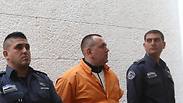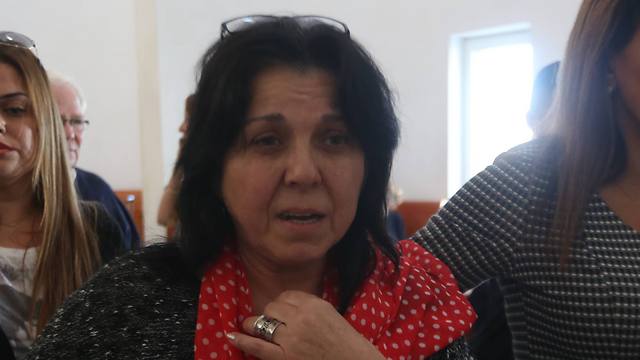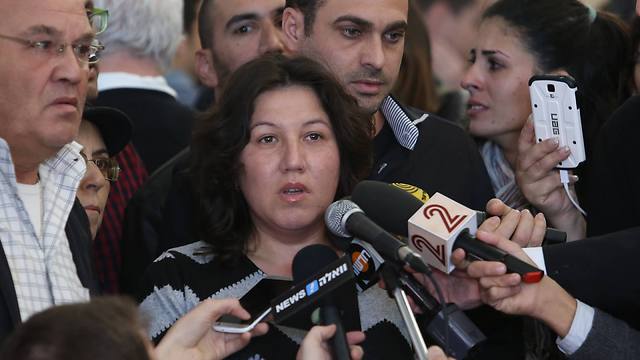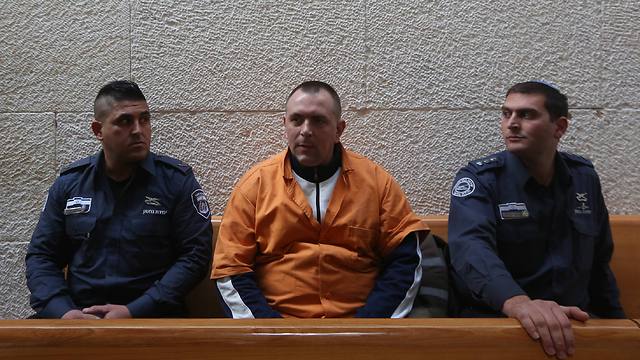
Supreme Court: Zadorov guilty of killing Tair Rada
Nine years after 13-year old Tair Rada's body was found dead in a bathroom stall at her school in Katzrin, her murder case might finally be decided. The Supreme court ruled in a split 2-1 decision that Roman Zadorov's appeal will be rejected, and his previous conviction for the murder not be overturned.
Nine years of legal and human drama have ended in a court decision – Roman Zadorov is the convicted killer of Tair Rada, the 13-year-old girl whose body was found at her school in Katzrin in the Golan Heights.
The Supreme Court ruled Wednesday that Zadorov's appeal of his two district court convictions will be rejected, and that he is guilty of the murder. Justice Yoram Danziger, who headed the three-justice panel, gave the minority opinion, voting to acquit Zadorov due to what he deemed was reasonable doubt. Justices Yitzchak Amit and Zvi Zilbertal voted to uphold the conviction.
Zadorov's lawyer, Avigdor Feldman, said that "There is an option for another discussion, and we certainly will submit such a request after thoroughly examining the ruling." He added, "I am disappointed of course, we were convinced that there is no evidence to convict Zadorov of the murder, there are too many non-ignorable question marks that hover above this case.
Justice Danziger wrote in his opinion, "The collection of evidence casts a heavy shadow on the question of his innocence. After examining the evidence, I've come to the conclusion that the appellant should be acquitted due to reasonable doubt." People in the courtroom cheered initially, not realizing that Danziger's opinion was in the minority.
Justice Danziger found that there was evidence that stood in contrast with confessions, among them a cut on Rada's body and the blood trail. He concluded that the finding that says the cut on Rada's chin was mad with a serrated blade is in contrast with the evidence. In addition Danziger claimed that the unidentified shoeprints in the bathroom stall lessen the power of the evidence.
Zadorov's wife, Olga, stood outside the courtroom following the decision, and told the media he did not commit the crime. "I want to start by saying that my husband is innocent," she said, "the justice system doesn't want to admit to making a huge mistake, ruined life – not for one person, but for two families. All of this material is built on lies by the prosecutor and the police. I want people to rise up, I want people to respond. Because tomorrow it could be any one of you."
She later said, "If there was an acquittal today, we would go out and look for the murderers. Sadly, that's not happening. Their daughter is rolling in her grave because her killer is free."
Tair's mother, Ilana Rada, who has expressed doubts about Zadorov being the killer in the past, claimed that the police did not examine all investigation avenues. Tair's father, Shmuel, however, supported the police and agreed with the court's decision to convict Zadorov.
After the decision was revealed, Ilana Rada said, "I came feeling that the Justices will look at things differently. I will continue to pursue Tair's killers until my dying day." She later added, "I still doubt that he's the killer. Since one Justice left the window open, to him being not guilty, we still have where to look."
During the trial, many different conspiracy theories were raised about the murder, as well as the reason police "latched on" to Zadorov, and didn't look in other directions. When giving their verdict, district court judges rejected these claims, dealing with some of them particularly. Still, many believe Zadorov isn't the real killer.
The body of 13-year-old eighth-grader Tair Rada was found in a bathroom stall at her school in Katzrin on December 6, 2006. Two suspects were arrested in the days that followed and then released. Zadorov, who worked at the school back then, was arrested a week after the murder – and after being interrogated for six days confessed to the killing and recreated it. During that period, he also confessed to the murder in front of an undercover informant who was put in his cell.
On the eve of the recreation, the police held a press conference in which they announced that the case was solved, but Zadorov recanted his confession less than a day later. His attorneys claimed that he confessed under duress, and that the "unique" details he confessed to details that only the killer should know were "fed" to Zadorov by his interrogators, who hinted at how he should act during the reenactment.
Zadorov's first trial began in January 2007, and over 120 witnesses gave their testimony during its proceedings. Thousands of documents and other evidence pieces were submitted. In the end, Zadorov was convicted unanimously by the three judges. Regarding than the confession, which they ruled should be admitted into evidence, one of the judges mentioned that Zadorov showed knowledge of the case that even the police didn't have at the time when he was confessing and recreating the act.
Among other things, the judge mentioned that the information about the angles at which Rada stood while her throat was slit came to the police through a forensic report only after the confession and recreation, as did the way in which the killer left the stall while stepping on her body.
The judges counted six such details overall, with differing levels of importance to each. They also ruled that there are other pieces of evidence that reinforce the case against Zadorov. Later, the Public Defender's Office took over Zadorov's defense, and appealed his conviction to the Supreme Court. The attorneys asked to return the case to the district court for a reexamination of the evidence, and in order to receive expert opinions on forensic evidence that wasn't presented during the trial. The Supreme Court agreed, and ordered that the case be reexamined.
The expert opinion regarded the killer's shoeprint, which was found on Rada's body, and the kind of knife with which she was killed. Experts claimed that it couldn't be determined that the shoeprint was Zadorov's and that the knife used to kill Rada was serrated, and not an xacto knife as Zadorov confessed to using.
However, even after hearing this testimony the court ruled that Zadorov was guilty, which led to the appeal whose ruling was given on Wednesday.
Telem Yahav, Yael Freidson, Reut Rimerman, and Ahiya Raved contributed to this report.














